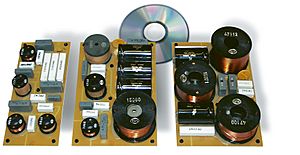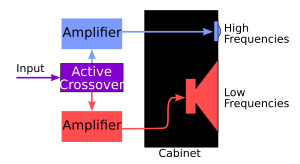Audio crossover facts for kids
An audio crossover is an electronic circuit. It separates different sound frequencies in an audio signal. Think of it like a traffic controller for sounds.
This separation is very important for loudspeakers. Small speakers, called tweeters, are made for high-pitched sounds. If they get strong low-pitched sounds, they could break. Big speakers, like subwoofers, are best for deep, low sounds. They cannot play high sounds clearly. Audio crossovers make sure each speaker gets only the sounds it can handle best.
Types of Audio Crossovers
Audio crossovers come in two main types: passive crossovers and active crossovers. Both do the same job of splitting frequencies. However, they work in different ways and use different parts.
Passive Crossovers
Passive crossovers are simpler circuits. They are placed after the amplifier and before the speakers. This means they use the power from the amplifier to work.
- How they work: They use basic electronic parts. These include capacitors, inductors, and resistors.
- Components:
* Capacitors block low frequencies and let high frequencies pass. * Inductors block high frequencies and let low frequencies pass. * Resistors can be used to adjust the loudness of certain sounds.
- Power use: Passive crossovers do not need their own power source. But, if they use resistors to change loudness, these resistors can create heat. This means some power from the amplifier is lost as heat.
- Adjustability: They are usually built for a specific setup. It is not easy to change how they work once they are made.
Active Crossovers
Active crossovers are more complex circuits. They are placed before the amplifier. This means they split the audio signal into different frequency bands before the signal gets amplified. Each frequency band then goes to its own amplifier.
- How they work: They use resistors and capacitors, but also other electronic parts. These can include special chips that help process the sound.
- Power use: Active crossovers need their own power source. However, they usually use very little electric power. They do not lose much power as heat.
- Adjustability: Active crossovers are often designed to be easily adjustable. You can change the crossover points (where frequencies are split) or the loudness of each band. This gives you more control over the sound.
- Quality: Both passive and active crossovers can offer high-quality sound. The choice depends on the specific audio system and what features are needed.
Images for kids
See also
 In Spanish: Filtro de cruce para niños
In Spanish: Filtro de cruce para niños
 | Stephanie Wilson |
 | Charles Bolden |
 | Ronald McNair |
 | Frederick D. Gregory |







